ABOUT
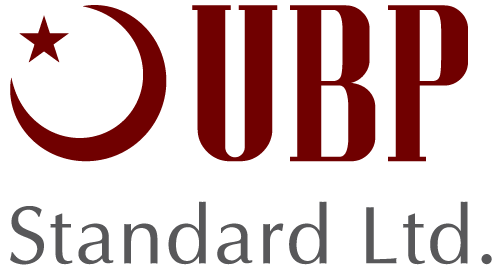
UBP Standard Limited (UBPS) was authorized on 3 October 2014 by the Sultanate of Sulu Archipelago, Mindanao and North Borneo (Sabah) as its Worldwide Halal Certification Authority, in cooperation with the United Bangsamoro People's Royal Sultanate of Sulu Borneo Archipelago Foundation (The Foundation). As such, UBPS is an international, independent organization for Halal Certification, Accreditation, Control and Development of global Halal market, which will be recognized by Governmental and Non-Governmental Organizations and by Islamic Authorities worldwide.
UBPS’s mission will be to guarantee the Halal status of consumed products both to Muslim Ummah and to all non-Muslim people consuming Halal products as well as to protect them against frauds and misleading situations all over the world.
UBPS’s vision is to develop a global integrated Halal market building up international Halal Standards systems and initiatives and putting together all efforts already developed worldwide.
What is the Foundation?
UBPRSSSNBAFI stands for United Bangsamoro Peoples Royal Sultanate of Sulu Sabah North Borneo Archipelago Foundation, Inc. Its major aspiration is to serve the people of the war-torn Mindanao through the initiation of humanitarian-service oriented project and the spearheading of the community development programs if necessities for a peaceful reconciliation and consolidation among the Royal Sultanates in Mindanao. The establishment of peaceful, developed and progressive Mindanao is one of the major vehicles in the realization of a strong and robust Philippines.
By doing good and demonstrating care to people such as helping a disabled person, giving food to the needy, doing voluntary work for nursing homes and other charity work, as well as a simple act of support to the advocacy of anti-bullying acts, we are already demonstrating our Humanitarian efforts.
It is the vision of the UBPRSSSNBAFI to effect peace and prosperity through reconciliation with honor and without bloodshed.
VISION
To create a just society in the Mindanao Archipelago which will be free from poverty, ecologically balanced, accountable, transparent, democratic and economically productive.
In an effort to establish peace and integration in war-torn Mindanao, walls and boundaries of all sorts among the many tribal groups in the archipelago region must be taken down. True and lasting peace is not a remote possibility if all inhabitants aspire, think and work as one community. Thus, economic development in Mindanao is the primary mission of UBPRSSSNBAFI for a united, progressive and peaceful Mindanao.
MISSION
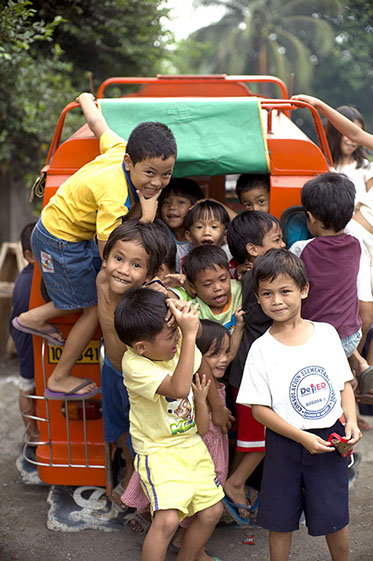
- To encourage and consolidate the Lumads, Muslims and Christians - all inhabitants of the region - to be active partners in the pursuit of community development, thus, the establishment of peace and harmonious co-existence in Mindanao and Palawan Provinces.
- To motivate the local population to become one productive, developed community of workers through the initiative of the UBPRSSSNBAFI sponsoring livelihood and investment projects/programs, thus, the elimination and neutralization of the idea of “individualism”.
- To assist, extend and encourage help to the under-privileged by inspiring them to participate in socio-economic community development projects.
- To spearhead in community-development projects such as establishment of local technical schools and hospitals, medical mission and similar activities.
- Leading community-development projects, the UBPRSSSNBAFI not only closely monitor the implementation of governmental programs, but to eliminate the possibility of graft and corruption by any parties.
- To support the government campaign against all kinds of threat to the country’s national security in any violent offence, etc.
- To coordinate and cooperate with cognizant in the realization of a true peace and development in Mindanao.
- To promote Halal as legal instrumental unity, peace and rehabilitation in Mindanao and in all Muslim world locally and internationally.
- To assist and promote the organization of sultanates from datus, princes, bai and other clan from the royal families both local and international for unity, common goals and empowerment.
- To empower the poor socially, economically, culturally and environmentally in order to enable them to exercise their human rights, and to live in their society with dignity and gender sensitivity.
- To assist and help to develop the ancestral domain of the United Bangsamoro Peoples’ Royal Sultanate of Sulu Sabah North Borneo Archipelago.
Values
Willingness to work with the deprived women, children and people of the coastal and riverine regions, comprising of ethnic and religious minorities, people with pro-active attitude, non-violent social action, gender sensitivity, human dignity, recognizing good works at all levels and mutual respect, commitment, cooperation, discipline, team work, transparency, accountability, secular outlook, cost-consciousness and participatory approach constitute UBPRSSSNBAFI’s core values.
Objectives
Major objectives of UBPRSSSNBAFI are as follows:
To reduce poverty
To empower the
poor socially and economically
To resist/ thwart environment degradation
To promote human rights and social justice
Background
The United Bangsamoro Peoples’ Royal Sultanate of Sulu Sabah North Borneo Archipelago Foundation, Inc. is a humanitarian socio economic institution duly registered on December 9, 2014 with Security Exchange Commission numbered CN 201423489 and company TIN No. 008-918-049. Its main office is at Lot 1 Phase 4, Block 4, Country Homes Ayala Subdivision, Zamboanga City, with forwarding office at Block 9 Lot 15 Phase 3 Camella, Lessandra, Bacoor City, Cavity Philippines, with international branch office at UBP Standard Limited (Incorporated), Unit 2611, Golden Era Plaza, 39 Sai Yee Street, Mongkok, Hong Kong.
The UBPRSSSNBAFI is non-profit by nature, and its main concern is advocating, peace, unity, and halal industry that belong to the Philippines and other foreign countries.
The creation of the UBPRSSSNBAFI is supported by Muslims in the Philippines and also the Royal Sultanate of Maguindanao, Royal Sultanate of Sulu, Royal Sultanate of Lanao del Sur, Royal Sultanate of Rajah Buwayaan, Royal Sulatanate of Tagolowan, Royal Sultanate of Balo-I, Royal Sultanate of Davao, Royal Sultanate of Zamboanga, Sibugay. Particularly the tribal Chieftain from different provinces in Mindanao, Philippines.
His Majesty Sultan Mangacop Umpa Bin Saud, Al-Haj Paramount Sultan of Mindanao is Chairman-CEO of the Foundation.
Purpose of the Foundation
Base on its registration with the Securities and Exchange Commission (S.E.C.), the purposes of the Foundation are as follows:
- To assist and promote the organization of sultanate from Datus, Princess, Bai and other Clan from the royal families both local and international for unity, common goals and empowerment.
- To award Philanthropists, Leaders and renown peoples around the globe most especially from highly industrialized and developing countries, with laureate recognition from the United Bangsamoro Peoples’ Royal Sultanate of Sulu Archipelago and the Mindanao Tribal Governance for Self-Determination and Empowerment Inc.
- To act as peace force for rehabilitation, development and unity through the introduction of humanitarian business cooperation among local and international entities for the benefits of the less fortunate individuals who cannot afford the stable living most especially on Education, Health and Employment.
- To propose infrastructure projects of Universities, Hospitals, Rural Health Centers, Mosques, Madrasa and Church for the accommodation and well-being of the Tribal peoples coming from Muslims, Christians and Lumads with the aid of the Tap Philanthropist Groups and international Humanitarian Aid Agencies.
- To access grants and financial assistance of the different state members of the Organization of Islamic Conference (OIC) for the Socio-economic development of the Tribal peoples in Mindanao Tribal Governance for Self-Determination and Empowerment Inc. with the clearance and support from the office of the President of the Republic of the Philippines.
- To access grants and donations of the Arab League of the States for the Socio-economic development of the Tribal peoples in Mindanao Tribal Governance for Self-Determination and Empowerment Inc. with the clearance and support from the office of the President of the Republic of the Philippines.
- To access grants and funding assistance of the Muslim World League for the socio-economic development of tribal people in Mindanao Tribal Governance for Self-determination and Empowerment Inc. with the clearance and support from the Office of the President of the Republic of the Philippines.
- To access with the different state members of the United Nation (UN) donations and development funding assistance for the socio-economic development of the Tribal people in Mindanao Tribal Governance for self-determination and empowerment Inc. with the clearance and support from the Office of the President of the Republic of the Philippines.
- To assist and support Rehabilitation Center of Orphanage widows and the less fortunate especially the street children in the international philanthropic groups.
- To conduct seminars, symposiums and skills training that would cater the needs for livelihood of the tribal people coming from Muslims, Christians and Lumads.
- Pre-departure Orientation seminars for the intending Muslims Overseas Filipino Workers who cannot afford the training fees in coordination the POEA.
- To access grants and donations of the Arab League of the States for the Socio-economic development of the Tribal peoples in Mindanao Tribal Governance for Self-Determination and Empowerment Inc. with the clearance and support from the office of the President of the Republic of the Philippines.
- To promote Cultural Groups both local and International.
- To access from the different foreign companies, manpower skills, job orders, visas for qualified Tribes, Muslims, Christians and Lumads.
- To provide scholarship to poor but deserving students.
- To give proper recognition through conferment of awards of excellence and distinction to individuals or groups worldwide who have distinguished themselves as brilliant exemplars of society indifferent journalism, academic, politics, performing arts, philanthropy, economics, visual arts, engineering, technology, agricultural industrial and internationalism on whom contributed the attainment of peace and respect for human life and dignity.
About Noble Sharifs
Noble Sharifs are descendants of the Prophet Muhammad (Peace Be Upon Him) through His two well-guided grandsons Imam Hussein and Imam Hasan (Peace be upon them). The first Sultan of Sulu - Sultan Shariful Hashim - being our ascendant was the great grandson of Imam Hussein. He was the one who propagated Islam as well as its Laws and Governance in Mindanao, most especially here in Sulu. When the Sulu natives were Islamized and became Muslims, it was they who proclaimed Sultan Shariful Hashim. His descendants before and until now have been respected and honoured by the people here in Mindanao, especially those who know the history.
Here in Sulu, the Royal Culture are still given preference. A Datu, even if he belongs to the bloodline of the Sulu Sultanate, cannot be an heir to the throne unless he has Sharif blood, or at least through his mother. Even if he may be qualified and chosen, he must be proclaimed by a full blooded Sharif as a royal requisite before he can be pronounced as Sultan.
History of Sultanate of Sulu
The Sultanate of Sulu (Jawi: سلطنة سولك, Arabic: سلطنة سولك) was a Muslim state that ruled over many of the islands of the Sulu Sea, parts of Mindanao, certain portions of present-day Sabah (then North Borneo) and North Kalimantan.
The sultanate was founded in 17 November 1405 by a Johore-born explorer and religious scholar Sharif ul-Hashim. Paduka Mahasari Maulana al Sultan Sharif ul-Hashim became his full regnal name (Shariful Hashil is his abbreviated name). He settled in Buansa, Sulu. After the marriage of Abu Bakr and a local dayang-dayang (princess) Paramisuli, he founded the sultanate. The Sultanate gained its independence from the Bruneian Empire in 1578.
Pre- establishment
The present area of the Sultanate of Sulu was once under the influence of the Bruneian Empire before it gained it own independence in 1578. The earliest known settlement in this area was in Maimbung, Jolo. During these times, Sulu was called Lupah Sug. The Principality of Maimbung, populated by Buranun people (or Budanon, literally means "mountain-dwellers"), was first ruled by a certain rajah who assumed the title Rajah Sipad the Older. According to Majul, the origins of the title rajah sipad originated from the Hindu sri pada, which symbolizes authority.
Before the arrival of Islam, the island was inhabited by several cultures, and was reigned over by three independent kingdoms ruled by the Buranun, Tagimaha, and Baklaya peoples. Likewise, the socio-political systems of these kingdoms were characterized by several distinct institutions: rajahship, datuship, tuanship and timwayship.
Islamisation & Establishment
At the end of the 14th century, Chinese Muslims, Arabs, Persians, Malays, and Indian Muslims introduced Sulu and other Muslim sultanates to Islam. Chinese Muslim merchants participated in the local commerce, and the Sultanate had diplomatic relations with China during the time of the Ming Dynasty (1368–1644), being involved in the tribute system. The Sulu leader Paduka Batara and his sons moved to China, where he passed away and Chinese Muslims brought up his sons.
In 1380 AD, Karim ul-Makhdum arrived in Simunul island from Malacca with Arab traders. Apart from being a scholar, he operated as a trader, but some saw him as a Sufi missionary originating from Mecca. He preached Islam in the area, and was thus accepted by the core Muslim community. He was the second person who preached Islam in the area, following after Tuan Mashā′ikha. To facilitate easy conversion of non-believers, he established a mosque in Tubig-Indagan, Simunul, which became the first Islamic temple to be constructed in the area, as well as the first in the Philippines. This later became known as Sheik Karimal Makdum Mosque. He died in Sulu, though the exact location of his grave is unknown. In Buansa, he was known as Tuan Sharif Awliyā.
Social Class System
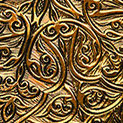
Sultan (su-sultanun)
Sultan (su-sultanun), which is acquired purely by lineage to the sultanate. All male members of the Royal House of Sulu should hold this hereditary title and should hold the style: His Royal Highness or His Highness, according to the traditional customs of Royal House of Sulu. Their spouses should automatically hold the title of Putri (princess of the first degree) and should hold the style: Her Royal Highness or Her Highness.
Within the Sultanate of Sulu, nobility cannot be acquired. It is by lineage only, a "closed system" whereby the titled persons inherit their offices of powers and prestige. There are two main social classes in Royal Sultanate of Sulu:

Datu Sadja
Datu Sadja, which may be acquired through confirming the titles (gullal) on the middleman of the Sultan. The gullal is made if a commoner has achieved outstanding feats or services in line of duty through display of bravery, heroism, etc. Datu Sadja is life title of nobility and the title holders should hold the style: His Excellency. Their spouses should hold the title of Dayang and should hold the style: Her Excellency.
The Commoners
Maharlika are those who do not trace their descent from royalty, but hold responsible positions involving administrative matters:
Wakil Kesultanan – region representative outside Royal Sulu Sultanate
Panglima – region representative inside Royal Sulu Sultanate
Parkasa – aide-de-camp of region representative inside Royal Sulu Sultanate
Laksaman – sub region representative inside Royal Sulu Sultanate
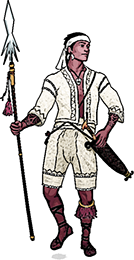
The males who hold offices above shall be addressed by the title of nobility Tuan (the title is directly attached to the office), followed by the rank of the office they hold, their given name, surname and region.
The females who hold offices above shall be addressed by the title of nobility Sitti (the title is directly attached to the office), followed by the rank of the office they hold, their given name, surname and region.
Garments Worn by Sultan and Royals
Preferably in golden and white which showcases the finest and expensive silks such as velvet. Later, they were replaced with lighter and simpler fabrics such as satin, taffeta, gezi (thickly woven silk cloth) made with decorative patterns and sometimes with large amount of gold and silver thread.
Headgear are also worn by Sultan’s to complete their outfit and also served as an important status symbol especially during ceremonies and reception days.
Our Strength
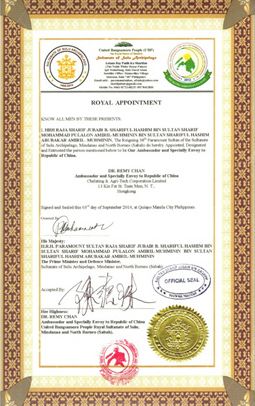
© 2015 UBPS. All Rights Reserved.